|
1
|
Van Poznak C, Somerfield MR, Bast RC,
Cristofanilli M, Goetz MP, Gonzalez-Angulo AM, Hicks DG, Hill EG,
Liu MC, Lucas W, et al: Use of biomarkers to guide decisions on
systemic therapy for women with metastatic breast cancer: American
society of clinical oncology clinical practice guideline. J Clin
Oncol. 33:2695–2704. 2015. View Article : Google Scholar : PubMed/NCBI
|
|
2
|
Khatcheressian JL, Hurley P, Bantug E,
Esserman LJ, Grunfeld E, Halberg F, Hantel A, Henry NL, Muss HB,
Smith TJ, et al: Breast cancer follow-up and management after
primary treatment: American Society of Clinical Oncology clinical
practice guideline update. J Clin Oncol. 31:961–965. 2013.
View Article : Google Scholar : PubMed/NCBI
|
|
3
|
Deng QQ, Huang XE, Ye LH, Lu YY, Liang Y
and Xiang J: Phase II trial of Loubo® (Lobaplatin) and
pemetrexed for patients with metastatic breast cancer not
responding to anthracycline or taxanes. Asian Pac J Cancer Prev.
14:413–417. 2013. View Article : Google Scholar : PubMed/NCBI
|
|
4
|
Garin A, Manikhas A, Biakhov M, Chezhin M,
Ivanchenko T, Krejcy K, Karaseva V and Tjulandin S: A phase II
study of pemetrexed and carboplatin in patients with locally
advanced or metastatic breast cancer. Breast Cancer Res Treat.
110:309–315. 2008. View Article : Google Scholar : PubMed/NCBI
|
|
5
|
Llombart-Cussac A, Theodoulou M, Rowland
K, Clark RS, Nakamura T, Carrasco E and Cruciani G: Pemetrexed in
patients with locally advanced or metastatic breast cancer who had
received previous anthracycline and taxane treatment: Phase II
study. Clin Breast Cancer. 7:380–385. 2006. View Article : Google Scholar : PubMed/NCBI
|
|
6
|
Dittrich C, Solska E, Manikhas A, Eniu A,
Tjulandin S, Anghel R, Musib L, Frimodt-Moller B, Liu Y, Krejcy K
and Láng I: A phase II multicenter study of two different dosages
of pemetrexed given in combination with cyclophosphamide as
first-line treatment in patients with locally advanced or
metastatic breast cancer. Cancer Invest. 30:309–316. 2012.
View Article : Google Scholar : PubMed/NCBI
|
|
7
|
Vandana M and Sahoo SK: Reduced folate
carrier independent internalization of PEGylated pemetrexed: A
potential nanomedicinal approach for breast cancer therapy. Mol
Pharm. 9:2828–2843. 2012. View Article : Google Scholar : PubMed/NCBI
|
|
8
|
Pandyra AA, Berg R, Vincent M and
Koropatnick J: Combination silencer RNA (siRNA) targeting Bcl-2
antagonizes siRNA against thymidylate synthase in human tumor cell
lines. J Pharmacol Exp Ther. 322:123–132. 2007. View Article : Google Scholar : PubMed/NCBI
|
|
9
|
Yang M, Fan WF, Pu XL, Meng LJ and Wang J:
The role of thymidylate synthase in non-small cell lung cancer
treated with pemetrexed continuation maintenance therapy. J
Chemother. 29:106–112. 2017. View Article : Google Scholar : PubMed/NCBI
|
|
10
|
Chen CY, Chang YL, Shih JY, Lin JW, Chen
KY, Yang CH, Yu CJ and Yang PC: Thymidylate synthase and
dihydrofolate reductase expression in non-small cell lung
carcinoma: The association with treatment efficacy of pemetrexed.
Lung Cancer. 74:132–138. 2011. View Article : Google Scholar : PubMed/NCBI
|
|
11
|
Akbar S, Jordan LB, Purdie CA, Thompson AM
and McKenna SJ: Comparing computer-generated and
pathologist-generated tumour segmentations for immunohistochemical
scoring of breast tissue microarrays. Br J Cancer. 113:1075–1080.
2015. View Article : Google Scholar : PubMed/NCBI
|
|
12
|
Fukushima M, Morita M, Ikeda K and
Nagayama S: Population study of expression of thymidylate synthase
and dihydropyrimidine dehydrogenase in patients with solid tumors.
Int J Mol Med. 12:839–844. 2003.PubMed/NCBI
|
|
13
|
Llombart-Cussac A, Martin M, Harbeck N,
Anghel RM, Eniu AE, Verrill MW, Neven P, De Grève J, Melemed AS,
Clark R, et al: A randomized, double-blind, phase II study of two
doses of pemetrexed as first-line chemotherapy for advanced breast
cancer. Clin Cancer Res. 13:3652–3659. 2007. View Article : Google Scholar : PubMed/NCBI
|
|
14
|
Richards DA, Loesch D, Vukelja SJ, Wu H,
Hyman WJ, Nieves J, Wang Y, Hu S, Shonukan OO and Tai DF: Phase I
study of pemetrexed and pegylated liposomal doxorubicin in patients
with refractory breast, ovarian, primary peritoneal, or fallopian
tube cancer. Invest New Drugs. 29:963–970. 2011. View Article : Google Scholar : PubMed/NCBI
|
|
15
|
Jensen SA, Vainer B, Witton CJ, Jørgensen
JT and Sørensen JB: Prognostic significance of numeric aberrations
of genes for thymidylate synthase, thymidine phosphorylase and
dihydrofolate reductase in colorectal cancer. Acta Oncol.
47:1054–1061. 2008. View Article : Google Scholar : PubMed/NCBI
|
|
16
|
Le François BG, Maroun JA and Birnboim HC:
Expression of thymidylate synthase in human cells is an early G(1)
event regulated by CDK4 and p16INK4A but not E2F. Br J Cancer.
97:1242–1250. 2007. View Article : Google Scholar : PubMed/NCBI
|
|
17
|
Robert NJ, Conkling PR, O'Rourke MA,
Kuefler PR, McIntyre KJ, Zhan F, Asmar L, Wang Y, Shonukan OO and
O'Shaughnessy JA: Results of a phase II study of pemetrexed as
first-line chemotherapy in patients with advanced or metastatic
breast cancer. Breast Cancer Res Treat. 126:101–108. 2011.
View Article : Google Scholar : PubMed/NCBI
|
|
18
|
Denduluri N, Somerfield MR, Eisen A,
Holloway JN, Hurria A, King TA, Lyman GH, Partridge AH, Telli ML,
Trudeau ME and Wolff AC: Selection of optimal adjuvant chemotherapy
regimens for human epidermal growth factor receptor 2
(HER2)-negative and adjuvant targeted therapy for HER2-positive
breast cancers: An American Society of Clinical Oncology Guideline
adaptation of the cancer care ontario clinical practice guideline.
J Clin Oncol. 34:2416–2427. 2016. View Article : Google Scholar : PubMed/NCBI
|
|
19
|
Krop I, Ismaila N, Andre F, Bast RC,
Barlow W, Collyar DE, Hammond ME, Kuderer NM, Liu MC, Mennel RG, et
al: Use of biomarkers to guide decisions on adjuvant systemic
therapy for women with early-stage invasive breast cancer: American
Society of Clinical Oncology Clinical Practice Guideline Focused
Update. J Clin Oncol. 35:2838–2847. 2017. View Article : Google Scholar : PubMed/NCBI
|
|
20
|
Yu Z, Sun J, Zhen J, Zhang Q and Yang Q:
Thymidylate synthase predicts for clinical outcome in invasive
breast cancer. Histol Histopathol. 20:871–878. 2005.PubMed/NCBI
|
|
21
|
Kaira K, Okumura T, Ohde Y, Takahashi T,
Murakami H, Kondo H, Nakajima T and Yamamoto N: Prognostic
significance of thymidylate synthase expression in the adjuvant
chemotherapy after resection for pulmonary metastases from
colorectal cancer. Anticancer Res. 31:2763–2771. 2011.PubMed/NCBI
|
|
22
|
Takagi K, Miki Y, Nakamura Y, Hirakawa H,
Kakugawa Y, Amano G, Watanabe M, Ishida T, Sasano H and Suzuki T:
Immunolocalization of thymidylate synthase as a favorable
prognostic marker in estrogen receptor-positive breast carcinoma.
Histol Histopathol. 30:1223–1232. 2015.PubMed/NCBI
|
|
23
|
Marverti G, Ligabue A, Paglietti G, Corona
P, Piras S, Vitale G, Guerrieri D, Luciani R, Costi MP, Frassineti
C and Moruzzi MS: Collateral sensitivity to novel thymidylate
synthase inhibitors correlates with folate cycle enzymes impairment
in cisplatin-resistant human ovarian cancer cells. Eur J Pharmacol.
615:17–26. 2009. View Article : Google Scholar : PubMed/NCBI
|
|
24
|
Calascibetta A, Martorana A, Cabibi D,
Aragona F and Sanguedolce R: Relationship between thymidylate
synthase and p53 and response to FEC versus taxane adjuvant
chemotherapy for breast carcinoma. J Chemother. 23:354–357. 2011.
View Article : Google Scholar : PubMed/NCBI
|
|
25
|
Quintero-Ramos A, Gutiérrez-Rubio SA, Del
Toro-Arreola A, Franco-Topete RA, Oceguera-Villanueva A,
Jiménez-Pérez LM, Castro-Cervantes JM, Barragán-Ruiz A,
Vázquez-Camacho JG and Daneri-Navarro A: Association between
polymorphisms in the thymidylate synthase gene and risk of breast
cancer in a Mexican population. Genet Mol Res. 13:8749–8756. 2014.
View Article : Google Scholar : PubMed/NCBI
|
|
26
|
Shimizu T, Nakanishi Y, Nakagawa Y,
Tsujino I, Takahashi N, Nemoto N and Hashimoto S: Association
between expression of thymidylate synthase, dihydrofolate
reductase, and glycinamide ribonucleotide formyltransferase and
efficacy of pemetrexed in advanced non-small cell lung cancer.
Anticancer Res. 32:4589–4596. 2012.PubMed/NCBI
|
|
27
|
Ceppi P, Papotti M and Scagliotti G: New
strategies for targeting the therapy of NSCLC: The role of ERCC1
and TS. Adv Med Sci. 55:22–25. 2010. View Article : Google Scholar : PubMed/NCBI
|
|
28
|
Lee SJ, Choi YL, Park YH, Kim ST, Cho EY,
Ahn JS and Im YH: Thymidylate synthase and thymidine phosphorylase
as predictive markers of capecitabine monotherapy in patients with
anthracycline- and taxane-pretreated metastatic breast cancer.
Cancer Chemother Pharmacol. 68:743–751. 2011. View Article : Google Scholar : PubMed/NCBI
|
|
29
|
Li L, Sham YY, Bikadi Z and Elmquist WF:
pH-dependent transport of pemetrexed by breast cancer resistance
protein. Drug Metab Dispos. 39:1478–1485. 2011. View Article : Google Scholar : PubMed/NCBI
|
|
30
|
Wan F, Chen X, Dong LF, Cheng YH and Long
JP: A systemic analysis on pemetrexed in treating patients with
breast cancer. Asian Pac J Cancer Prev. 15:4567–4570. 2014.
View Article : Google Scholar : PubMed/NCBI
|
|
31
|
Fujishima M, Inui H, Hashimoto Y, Azumi T,
Yamamoto N, Kato H, Hojo T, Yamato M, Matsunami N, Shiozaki H and
Watatani M: Relationship between thymidylate synthase (TYMS) gene
polymorphism and TYMS protein levels in patients with high-risk
breast cancer. Anticancer Res. 30:4373–4739. 2010.PubMed/NCBI
|
|
32
|
da Silva Nogueira J Jr, de Lima Marson FA
and Silvia Bertuzzo C: Thymidylate synthase gene (TYMS)
polymorphisms in sporadic and hereditary breast cancer. BMC Res
Notes. 5:6762012. View Article : Google Scholar : PubMed/NCBI
|
|
33
|
Wang B, Walsh SJ and Saif MW: Pancytopenia
and severe gastrointestinal toxicities associated with
5-fluorouracil in a patient with Thymidylate Synthase (TYMS)
Polymorphism. Cureus. 8:e7982016.PubMed/NCBIPubMed/NCBIPubMed/NCBIPubMed/NCBIPubMed/NCBIPubMed/NCBIPubMed/NCBIPubMed/NCBIPubMed/NCBI
|
















